THOUGHTS ON SURFING AND STEWARDSHIP
This article is lifted from the pages of Wavelength Vol. 263 and is always better in print. You can grab a copy of Vol. 263 here or subscribe for £25 a year, to receive both mags direct to your door along with a bonus freebie of your choice as a thank you for being part of the Wavelength fam.
All photos: Leia Marasovich
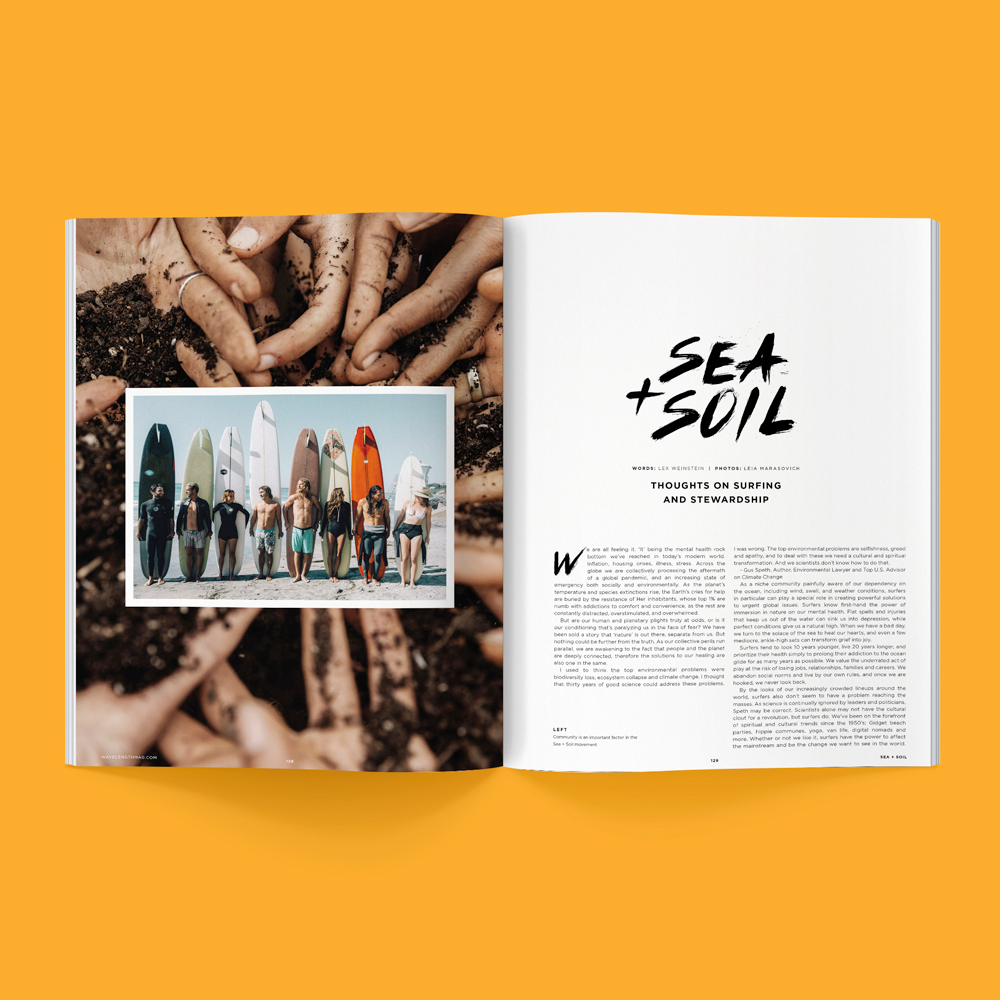
We are all feeling it. ‘It’ being the mental health rock bottom we’ve reached in today’s modern world. Inflation, housing crises, illness, stress.
Across the globe we are collectively processing the aftermath of a global pandemic, and an increasing state of emergency both socially and environmentally. As the planet’s temperature and species extinctions rise, the Earth’s cries for help are buried by the resistance of Her inhabitants, whose top 1% are numb with addictions to comfort and convenience, as the rest are constantly distracted, overstimulated, and overwhelmed.
But are our human and planetary plights truly at odds, or is it our conditioning that’s paralyzing us in the face of fear? We have been sold a story that ‘nature’ is out there, separate from us. But nothing could be further from the truth. As our collective perils run parallel, we are awakening to the fact that people and the planet are deeply connected, therefore the solutions to our healing are also one in the same.
I used to think the top environmental problems were biodiversity loss, ecosystem collapse and climate change. I thought that thirty years of good science could address these problems.
I was wrong. The top environmental problems are selfishness, greed and apathy, and to deal with these we need a cultural and spiritual transformation. And we scientists don’t know how to do that.
– Gus Speth, Author, Environmental Lawyer and Top U.S. Advisor on Climate Change
As a niche community painfully aware of our dependency on the ocean, including wind, swell, and weather conditions, surfers in particular can play a special role in creating powerful solutions to urgent global issues. Surfers know first-hand the power of immersion in nature on our mental health. Flat spells and injuries that keep us out of the water can sink us into depression, while perfect conditions give us a natural high. When we have a bad day, we turn to the solace of the sea to heal our hearts, and even a few mediocre, ankle-high sets can transform grief into joy.
Surfers tend to look 10 years younger, live 20 years longer, and prioritize their health simply to prolong their addiction to the ocean glide for as many years as possible. We value the underrated act of play at the risk of losing jobs, relationships, families and careers. We abandon social norms and live by our own rules, and once we are hooked, we never look back. View our Sea + Soil Collection of gear to keep you outdoors and surfing this Autumn here.
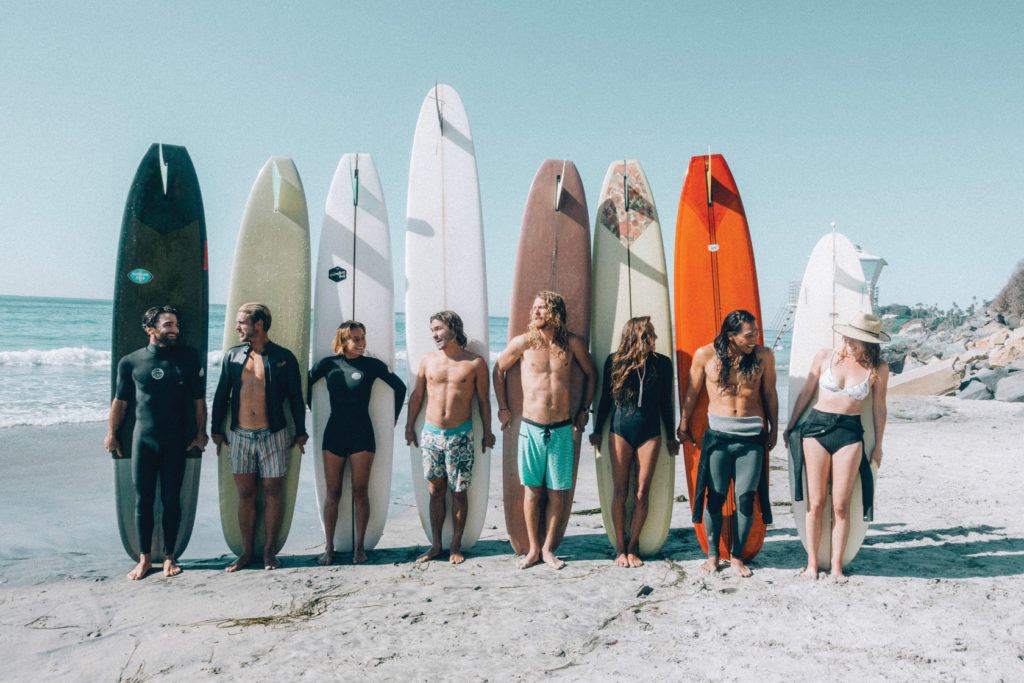
By the looks of our increasingly crowded lineups around the world, surfers also don’t seem to have a problem reaching the masses. As science is continually ignored by leaders and politicians, Speth may be correct. Scientists alone may not have the cultural clout for a revolution, but surfers do. We’ve been on the forefront of spiritual and cultural trends since the 1950’s; Gidget beach parties, hippie communes, yoga, van life, digital nomads and more. Whether or not we like it, surfers have the power to affect the mainstream and be the change we want to see in the world.
How we define being a ‘surfer’, however, must evolve from the beach bum cliché to one of Earth steward and activist in order to sustain healthy oceans for living and for surfing. Leveraging the popularity of surfing and organizing effectively could cause the shift needed to save us all.
The history of riding waves traces back to the First Peoples of Peru, Hawaii, and West Africa up to 5,000 years ago. At its roots, surfing is an Indigenous practice that was colonized and industrialized by Western cultures after Hawaiian Olympian Duke Kahanamoku shared it with the world in the 1920’s. One hundred years later we are being confronted with our modern surfing identity. Indigenous Peoples only make up 5% of the overall global population, but are responsible for protecting 80% of the world’s biodiversity. To appropriate surfing without incorporating its greater context is not only wrong, but detrimental to the next generations of surfers.
Indigenous cultures teach us that being in right relationship with place means understanding that our wellbeing is directly tethered to the wellbeing of our environment, and that our environment is not an ‘it’ or a ‘thing’, but ‘they’, ‘them’, and ‘us’, a mutual being with which we are deeply connected, even descendents, an extension or expression of.
Every single surfer on planet earth knows the feeling of being an extension of the waves we ride, and wakes up every day in search of that connection. However, rarely do we ask what to give in return. The gift of surfing, like all of Mother Earth’s gifts, does not come for free. Reciprocity is an act of repayment, the acknowledgement of the give-and-take relationship that serves to replenish our well of survival in order to sustain ourselves, our communities, and those who will follow long after we’re gone.
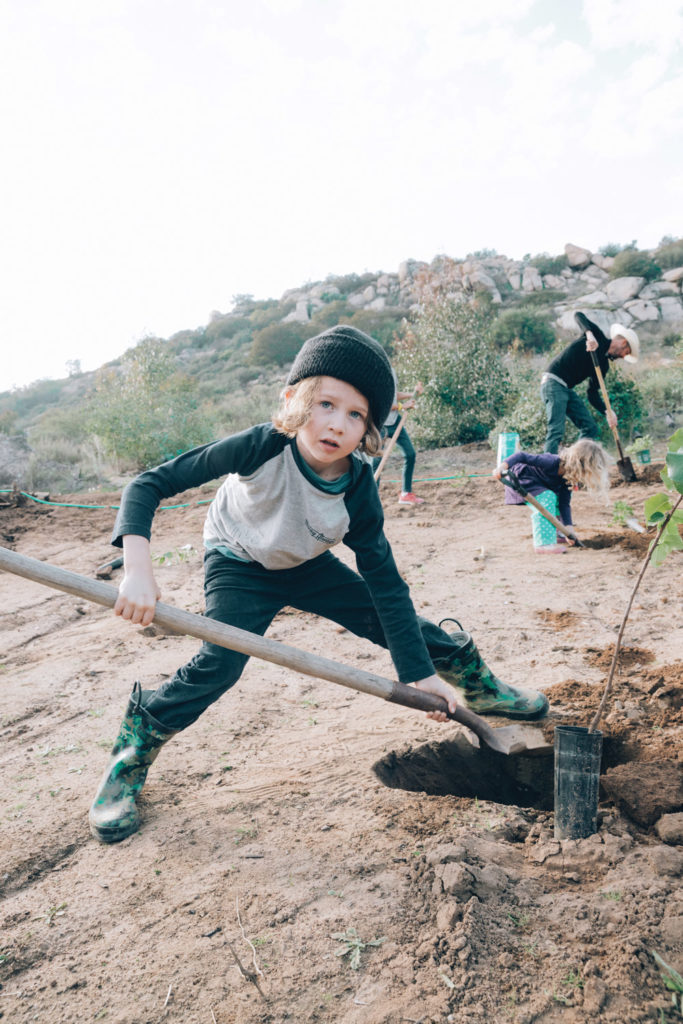
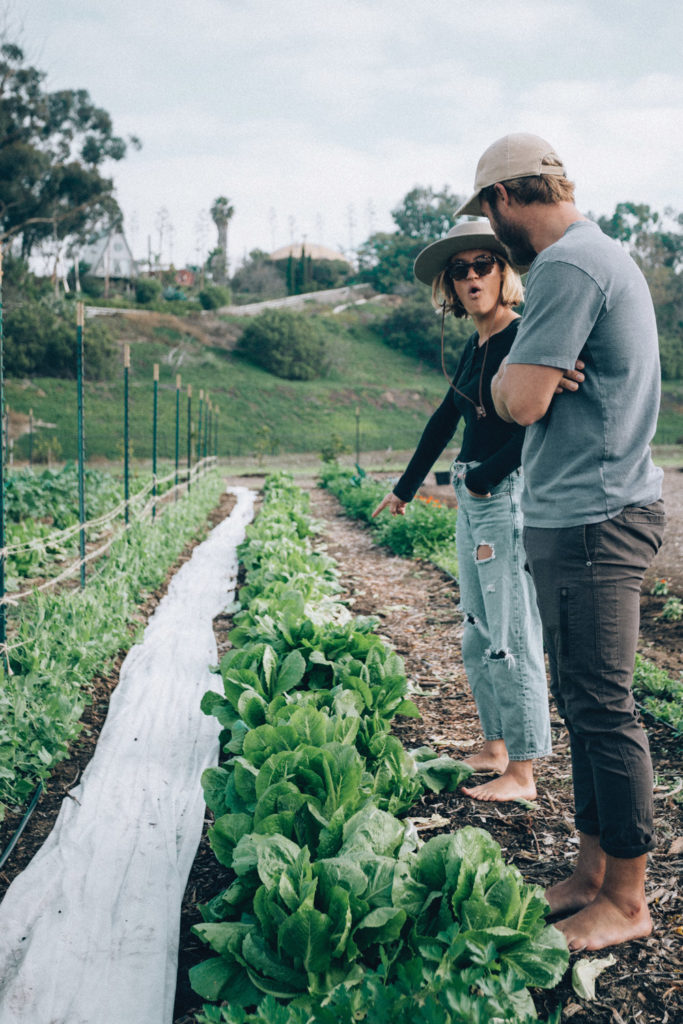
Being a surfer today means reevaluating and possibly redefining our relationship with ourselves, each other, and our environment. Are we simply here to use, take, soak up resources, and move on? What are the gifts we can give back in return? How do we fight the good fight in the face of immense corporate power, greed, and helplessness? Reciprocity for surfers comes in the form of stewardship, and of asking these questions, finding solutions, and choosing to no longer just take for ourselves, but use our personal power to protect our local ecosystem that gives us food, sustenance, and joy.
Surfing was born from the highly productive agricultural systems of ancient Hawaiians that fed a population nearly the size of today’s for almost 1,000 years. The Ahupua’a systems had wedge shaped divisions of land from the mountains down to their base in the ocean, appropriately cultivating the land based on its character. Wood from the mountains, vegetables from the fields, kalo (or taro root) from the valleys, and fish from the sea. One Ahupua’a would provide a community with everything they needed. These incredibly efficient systems created an abundance of free time that allowed for riding waves and having fun.
By no coincidence, Hawai’i is also where I found my love for agriculture. In 2016, after receiving my Permaculture Design Certification at Quail Springs Farm in Maricopa, California, followed by a tense presedential election, I retreated to a friend’s land on the North Shore of Kaua’i to immerse myself in an environmental studies program of my own design: farming and surfing. For six months, I slept in a tent under the stars, steps from the garden, harvesting my meals and living simply and slowly, creating community with dear friends, Adam and Zoli.
I spent my days in a revolving door; from working barefoot in the soil to submerged in the sea, absorbing as much information, experience, and positive and negative ions as possible (negative ions are present in white water and positive ions in the soil, both very beneficial for the human immune system and microbiome). It was during this auspicious time that things began to click, and the personal growth and physical and emotional healing that occurred gave me immense clarity on the importance of living in deep communion with the land. At a crowded surf spot one winter morning, I looked around and thought, ‘What if all surfers knew the medicine of sea and soil? What would surf culture look like if everyone in this lineup understood that living in reciprocity with the natural world is the key to personal and planetary healing?’
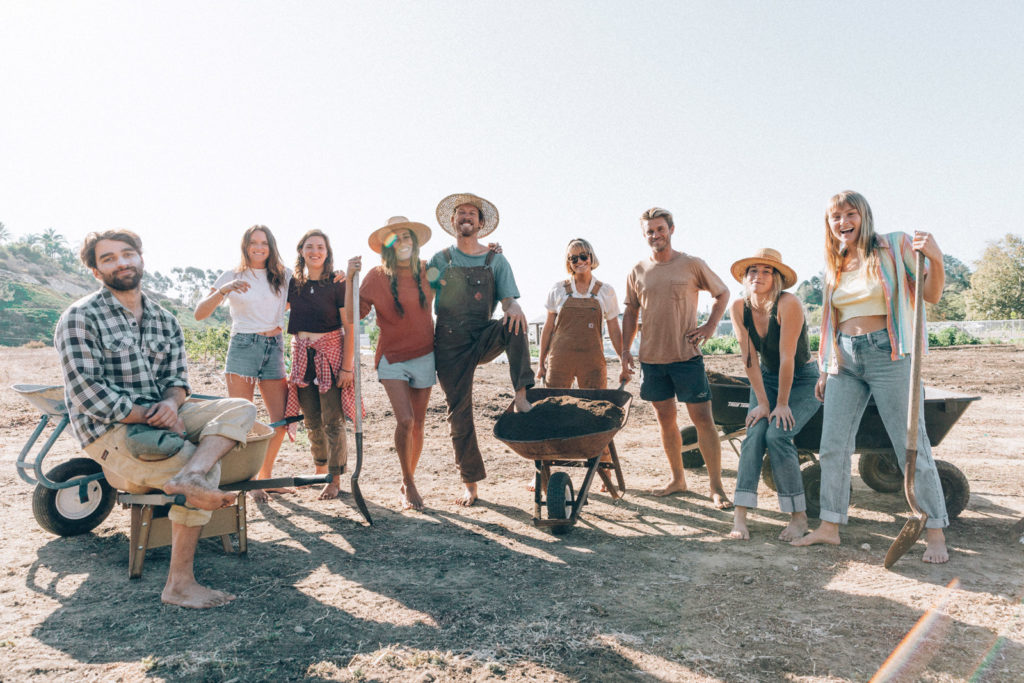
I went back to California and began texting friends to volunteer at local farms after surfing on Saturday mornings. I invited my friends, who then invited their friends, and numbers continued to grow. We began collaborating with an organization called Indigenous Regeneration and hosted events on Tribal land, where over 50 volunteers drove an hour inland to plant food forests and celebrate our annual Earth Day gatherings. In 2022 we also built a farm that continues to feed over twenty Kumeyaay families free of charge. Sea + Soil is now a nonprofit organization, and surf and garden movement, reconnecting and regenerating ecosystems and communities.
We are a diverse group of ocean lovers and plant folk, building a new Earth centered in radical joy, fellowship, and equal access to nature and food. We have regular surf and garden parties where we tackle projects together as a community, get dirty, learn and have fun, then wash off in the ocean with a surf. In our first year, we donated over 1,500 lbs of food to our local food bank, converted 1 acre of lawn and dirt to regenerative farmland, hosted over 30 surf and garden volunteer events, and educated one farm apprentice, 130 volunteers, and 45 weekly participants.
Growing our own food as an act of reciprocity is also one of rebellion (which we surfers love). Our current agricultural systems are toxic and broken. U.S. industrial agriculture is responsible for 31% of human caused greenhouse gas emissions, and according to the EPA, it is also the nation’s leading cause of impaired water quality. These environmental problems are also social problems, as climate change both drives and results from hunger. When we opt out from supporting destructive industries, we catalyze a ripple outward that, in a huge way, supports people and the planet.
How can we honor the privilege of the title ‘surfer’ starting today? And hold our community accountable to do the same? Embodying Earth stewardship is a mindset and practice that honors our Indigenous ancestors who gifted us not only the sport, but the way of life.
Here are some ways to begin your journey of Earth stewardship today:
Pay attention
This doesn’t mean drowning yourself in news and social media. It means to notice the ways in which you feel connected to the environment around you. Notice how you feel when you are ignoring her vs. immersed in her presence. Ask questions like where does your food and water come from? Who were the people who inhabited your land pre-colonization? How did they live? What areas of your life are most wasteful? How can you be more aware of your surroundings? How do you feel when you live with more awareness? Follow those instincts, continue to ask questions, research and find a like minded community who are also asking these questions.
Decolonize your mind
Shift your values and mindset towards collaboration over competition, ‘we’ vs. ‘me’, circularity over single use, and being a voice for the voiceless. Try books like The Four Agreements and Braiding Sweetgrass, or podcasts like For The Wild and Water People Podcast to open your perspective and challenge your conditioning.
Heal your inner world to heal our outerworld
Try therapy, meditation, and mindfulness practices. Hydrate, eat more plant-based food, treat your body as a temple. Keep your room clean, your car clean, respect yourself by respecting your every day environments. Once you master this, you will begin to understand the respect needed to step into a garden.
Create and encourage a more inclusive and respectful surf space through the lens of custodians
Be kind to others in the lineup. Smile and understand your privilege in paddling out. Celebrate biodiversity in the water as we do on land amongst humans, plants, and animals that make up our thriving ecosystems. Recognize that systemic oppression has given unfair advantages to those who can afford to live by the coast. Donate to surf access organizations or volunteer your time. Be compassionate to new surfers and offer them safety tips rather than aggression. As entitled as we feel to be in the ocean, we are a guest in her home as well. We are all lucky to be here, so act like it.
Take part in grassroots efforts on the local level that can grow up and out
Redefine what it means to be a surfer by engaging in civic duties. Organize beach cleanups or garden meetups, go to council meetings, VOTE, participate in community events and get to know your neighbors. How can we lean on each other if we don’t even know each other?
Practice grounding techniques
Stand barefoot at the beach or in your yard, take a few deep breaths and pause. Feel the Earth calm you. How can you give back for every wave and breath you take?
Find time to play
Meaningful play in the sea and soil is the medicine for modern day life. It also encourages us to protect what we love. Make time for play and have regular reminders that you are a part of something bigger than yourself.
Stewardship should become the norm of our lifestyle, and make its way into the cultural education of new surfers as they step into our world. Let’s lead by example.

This article is lifted from the pages of Wavelength Vol. 263 and is always better in print. You can grab a copy of Vol. 263 here or subscribe for £25 a year, to receive both mags direct to your door along with a bonus freebie of your choice as a thank you for being part of the Wavelength fam.
